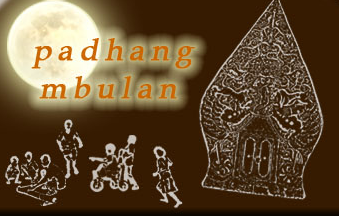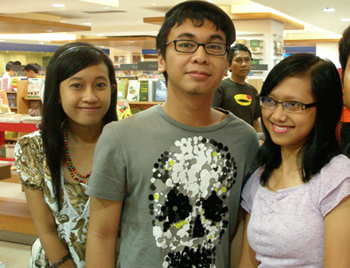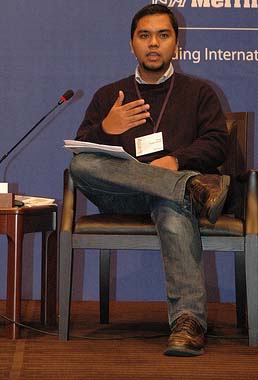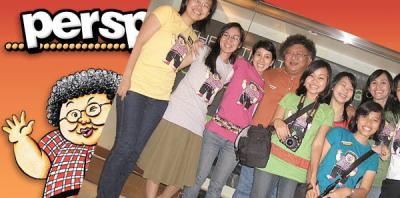Part 6 of the interview series: MUHAMMAD THAMRIN - THE POLITICAL BLOGGER
Thamrin is a historian and journalist, currently works for the Friedrich Naumann Stiftung in Jakarta - a German political foundation associated to the German Liberal Party (FDP) - and as a freelance journalist.
He is involved in the Friedrich Naumann Stiftung Project ‘Blogging for Democracy’ – a series of workshops with politicians and NGO workers to introduce them to the world of blogging and podcasting/videocasting. He also writes his own blog called ‘Other stories about freedom’ and initiated ‘Kedai Kebebasan’.
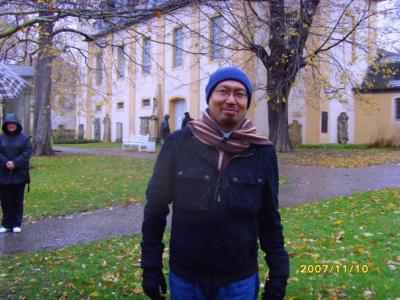
Mr. Thamrin, here not in Jakarta, where I spoke to him in a Café in the Kemang area, but from what it looks like somewhere in Europe
Personal background in blogging
My first time getting in touch with blogs was in 2006. I was told by one of my friends. I had my first blog at blogspot. At first there were technical difficulties, I didn’t take it so seriously. Then I participated in a workshop in the Philippines, I was invited with the FNS staff to go there. A three-day workshop. They introduced me to a simple type of blog software, wordpress. I created a simple blog in this workshop, which I still use today. I found this easier than blogspot, although blogspot has become more user friendly today. The workshop enlightened me. Aside from blog, they also introduced me to podcast.
I blog from work, home, or even when I travel. I also take care of our office website. Priority is the office website… so the blog I do normally at home. I use dial-up.
My background is journalism. So writing is an everyday thing for me. And I had the experience with the office website for a long time. But sometimes you have some personal things you want to write which can’t be put on the website. The website should be official – you can write an opinion – but sometimes you want to write with an informal language, very simple, short, then I find a blog is the best to write something like that. When you want to write about your feeling, you want to criticize somebody, you can do that on your blog, you can’t do that on the website. I’m working for a political foundation, so everything has to link to that.
The readers will come with or without your call, based on the topic they’re interested in. I mostly write about public services, political economy, political parties, democratization, corruption. I used to work for Indonesia Corruption Watch and the articles that are most frequently visited arte the ones about corruption and good governance. I use tags. I put tags like good governance, corruption, and when ppl search on google, they will find me. I think they find the articles because they are interested in these topics.
I´m happy some of the articles are used by readers as university reference, or even in highschool. Then they leave a message: thanks, because I`m using this article for my background… I think they respect my opinion because of my professional experience, maybe.
I also try to make links, to other people’s blogs. This is a way to promote your blog. If you visit other people’s blogs, leave comments, then you can leave your address to your own blog too. This is kind of an unwritten code. If I know your blog from your trackback, I will have a look at your blog to see what you have to say. This is how you generate your network.
Blogging culture in Indonesia
I think blogging is a kind of popular culture. Not only blog, but also podcasts or vcast. It´s a kind of trend, I think, because everyone is talking about it. If you want to have a network, you have nice pictures, you put it into friendster. But now if you have nice pictures or films, you just put it on a blog. You don’t even need to write anything. It’s what’s popular now. I’ve seen that a couple of times.
The thing is with blogs, if you write about politics, economics, good governance, corruption, they way you link will indirectly be in this community. It’s really rare that some people who normally put, like, underground pictures on their blog, and are really young [come to my blog], but sometimes 1-2 of these blogs have visited me and I went back and I found these types of blogs. They only put copy of music, though it’s illegal, they put MP3 in their blog, photos, or they link to youtube…. But on the other side I think it’s more people who want to say something. They want to complain about public service, complain about transport system, about religious things or they want to write something about cooking, healthcare, family, things usually not have an access to mainstream media. Maybe because they are not acknowledged as a good writers. In the formal media you have to have a good background to be accepted. But maybe they want to write. They have found a way for their aspirations to write in their blog.
Also in connection to this, aspirations and culture, is the mushrooming of the internet warung. If you don’t have internet at home, or at the office, you can go to the warnet or, especially now, to the cafés that provide hotspot. I think this is the reason why it became popular.
In addition to that, since 2006, I think some of the famous government people, like from the ministry, have a blog. So blogging is now a style from the young to the very top politicians, like Wimar Witoelar, SBY, Yussuf Kalla… oh, if they have a blog, why don’t have one?
Freedom of opinion
But the biggest reason for blogging is, they can write anything in their blog, without censorship. You can write from radical things, like against Israel, radical Islam, until to the topic of riding bicycles to the office. You can write anything in blogs and this makes it more and more popular.
The ministry of information and telecommunication supports us. The government still allows blogs, also some of the big media provide blogs, kompas has a blog, tempo magazine online has a blog… this will become more and more.
Minister Nuh’s Role at Pesta Blogger? I think they want to show to the media or to the people that the government gives you freedom to write or to give a comment or to criticize. I think this is in line with SBY himself who has his own blog. Also SBY never gave pressure to the media even if you criticize his cabinet or government, in written text or programs in television, he never gave pressure. This is the policy of the government. Also I think the government and also the ministry doesn’t want to get into problems. You know if they make prohibition, then it’s also they have to control SBY’s blog himself. It’s in the policy of the government giving people freedom to express their political ideas, opinions, everything.
When Gus Dur was president, he closed the ministry of information. It was one of the tools of the government, like a PR for the government. They closed the department and most of the offices in the provinces and kabupatens.
Megawati was the one trying to put a new ministry on information and technology. I think this most likely dealing with things related to information technology, telecommunication lines, broadban for radio and television, regulating the channels and also the space of television and radio. But they are not related to the contents. This is the difference. They are not dealing with the content. The ministry or department is dealing with infrastructure or technical side of communication. This department will act if you will monopolize a line for television or radio, or they act if you monopolize the license for TV and Media. But they will not control what you write and send.
Blogging for democracy
About blogging for democracy: we had several workshops in Jakarta three times in Jakarta and once in Semarang in central Java. We always offer it to our political party contacts, that we provide capacity building for blogging and podcasts. They ask us to have this training. There are many requests for having blog training, they see it´s a modern technique to reach their constituents. Sometimes we have a problem to find a place where we can conduct the training. If the participants are 15, we have to provide 15 computers and access. There are not so many places like that in Jakarta. Maybe the universities, also in interent service stations, they provide, but we have to manage it that the cost is not so expensive. By renting the computers it will be too expensive. We experience having the workshop in the internet café, it really cost us a lot. Then we have the experience of having it in the office of the party, there we could reduce part of the cost. Not all the political parties have good computers and internet access. We have many programs and we have to divide the budget. There are many requests, not only from the headquarter but also from the provincial level. Usually we provide the trainers and the computers and the party provides internet access, food.
From 15 people at the workshop, maybe only 1 or two continue blogging. Sometimes they come from a different background. Maybe they are good in speaking but not good in writing. Then they feel like they can’t write. This is the first handicap. The second is, they are not really familiar with internet and computer things. Even in one of our workshops, we had to teach how to login into the email. How to make an email account. How to upload… they are really interested during the workshop, but after the workshop because they have many activities, and they are not familiar with it, they don’t have a computer at home, they don’t have internet at home… so after the workshop, they don’t continue.
They understand that this is the kind of modern technique to reach constituents to know their ideas and opinions. But there are many problems like I cannot write, don’t have computer or internet connection. Sometimes they get other people to write. This is typical for Indonesian politicians. Maybe sometimes they become involved in politics from different backgrounds. Sometimes from being famous in society, even only with elementary school background, come into politics. Not all of them understand and are familiar with communication technologies.
With some political parties these kind of problems don’t really matter. Like in PKS, most of them have a university background, very intellectual, they are familiar with the internet. But we are not dealing with this party. This is the policy of the foundation. Like PKP, PDIP, they are not very familiar with this. PDIP only recently got their website. With PAN, they are familiar with this, they have internet at their office.
They start to realize how important the modern communication technologies are. Maybe not the blogs, but at least websites. Now PKP, PDIP have a good website. When we advise in bloggin and podcasting, we advise them not only to do that but also their website. We conducted a survey of the websites of political parties in 2007 and most of them are not really updated and not complete in providing information like constitution of the party. So in these things we advise them, with a good website providing all information, people will know you as a party and your objective. Then if you have a blog, you as a person who is involved in the party will be known by the constituents, you are the one who are a good candidate for instance.
Other efforts to promote the spread and use of internet
I don’t know the digital divide project. I know Internet Masuk Desa. Internet goes to the village. I don’t know if it’s related to it. Until the village level, the government office should have a link to the internet. The idea is to get computers go to the school, until the village level, elementary school in the village. It’s a government program, supported by Microsoft. With the Habibie center I don’t know. I heard about a program by Dell, providing a cheap laptop, the 100 Dollar laptop.
Of course, there will also have to be a policy of training and education how to use these technologies. That’s also needed because if you have connections and computer and you can’t use it to maximize the computer, it’s useless.
In the city this is happening, also some big cities in the province, but not until the rural area. Some schools, related to the education sector, have some good facilities. In the rural areas, the warnet is the way for the young people how to learn to use the computer, if they don’t have it at school. The young people learn it there, in their own time.
Internet infrastructure
The thing is it’s not only the duty of the government. if the government wants to be faster with internet connections to the village, they should allow private companies to be involved. But right now the fixed line is monopolized by Telcom. It’s a government company. Although it is privatized, most of the shares belong to the government. So it’s always inline with the government policy. If there is a private involved, they only build the line, but not the connections. The services will be managed by Telcom. I think if the government wants to be faster in this sector, they should allow not only building the infrastructure but also the services. But on the other side, the cell phone technology becomes cheaper. The government should encourage the private sector to be involved. I don’t know how far the government will allow. On the other side, they want to extend or they want more people to have access to internet. If the government provides a good policy on this sector, I think some privates will go in this sector.
Now the cell phones also reach until the village. Sometimes in the village, people will have two telephones. I think this is the first step where people realize information is important. Information and communication. After that the next step is the internet. Get an access, get information, something that is not provided in school. People want to know everything. Also aside form the telecommunication systems, computers become cheaper. You can get a PC for thee million or 4 million with internet access. People are thinking now: I have a computer, I have a telephone access, why am I not using it for internet access? They don’t only want it for information, but also to do business at home, not only having internet but having access to clients.
The only thing is the speed in that what people need for information is not the same as the speed of the government providing access. Again if you want to have access to the internet, you have to go through Telcom. This is the cheapest. But there are not so many investors who are interested in investing in this because of the regulation itself. You have to cooperate with Telcom. If the government deregulates the sector, it will become more and more. Even now with the Flexy thing, you buy the pulse and you connect to the laptop, that´s already something. More and more people use internet. I think it will be more if the government provides proper policies in these telecommunications. If you read the newspaper, more real estates, hotels, housing complex, apartments, are offering hotspot, or internet connection, as one of the services. Internet is becoming like a additional value if you want to sell something. Like now in the café, providing hotspot, hotel providing hotspot. They know people are now more and more looking for the internet connection.
Unlimited access
I think the condition up to now, not banning or limiting anything on the blogs, also providing good infrastructure and regulations for access, this will help the blogosphere in Indonesia to grow and flourish. Also if the computers become cheaper and cheaper.
The threat may come from fundamentalist views. Or more and more young people getting access to pornography and betting. This may be a threat. But at home, you can limit access to certain addresses by using software. So this is a matter of choice. But you can’t stop everything. Young people have many ways too get access to what they’re interest in. So it is a matter of education. Even if you educate them, they can still go to these sites. It becomes a matter of choice. But it should not be limited by the government. The government should not limit the people to choose. The government, the society and family should be involved in the education and should make awareness and understanding how to use internet to the young generation. The situation now is asking the government to limit internet access. Also in the blog content itself there is a threat of fundamentalist campaigns, against USA…
There was a case of someone who put SBY’s or someone’s photos in their blog and they got arrested. But this is not about the blog, it was because of the manipulations he did on the photos. The trial was about the photos that got manipulated, not about the blog as a medium.
If there is a threat against someone, their individual rights, then maybe the government should do something, but this is not related to using internet. People should be free to write anything, unless it’s against the constitution or against individual rights. But not the use of the internet itself. Not blocking all the access in Indonesia to certain sites. If they want to limit people’s access to dangerous sites, it should not be by policy by the government it should be a policy of the individual or the family.
He is involved in the Friedrich Naumann Stiftung Project ‘Blogging for Democracy’ – a series of workshops with politicians and NGO workers to introduce them to the world of blogging and podcasting/videocasting. He also writes his own blog called ‘Other stories about freedom’ and initiated ‘Kedai Kebebasan’.

Mr. Thamrin, here not in Jakarta, where I spoke to him in a Café in the Kemang area, but from what it looks like somewhere in Europe
Personal background in blogging
My first time getting in touch with blogs was in 2006. I was told by one of my friends. I had my first blog at blogspot. At first there were technical difficulties, I didn’t take it so seriously. Then I participated in a workshop in the Philippines, I was invited with the FNS staff to go there. A three-day workshop. They introduced me to a simple type of blog software, wordpress. I created a simple blog in this workshop, which I still use today. I found this easier than blogspot, although blogspot has become more user friendly today. The workshop enlightened me. Aside from blog, they also introduced me to podcast.
I blog from work, home, or even when I travel. I also take care of our office website. Priority is the office website… so the blog I do normally at home. I use dial-up.
My background is journalism. So writing is an everyday thing for me. And I had the experience with the office website for a long time. But sometimes you have some personal things you want to write which can’t be put on the website. The website should be official – you can write an opinion – but sometimes you want to write with an informal language, very simple, short, then I find a blog is the best to write something like that. When you want to write about your feeling, you want to criticize somebody, you can do that on your blog, you can’t do that on the website. I’m working for a political foundation, so everything has to link to that.
The readers will come with or without your call, based on the topic they’re interested in. I mostly write about public services, political economy, political parties, democratization, corruption. I used to work for Indonesia Corruption Watch and the articles that are most frequently visited arte the ones about corruption and good governance. I use tags. I put tags like good governance, corruption, and when ppl search on google, they will find me. I think they find the articles because they are interested in these topics.
I´m happy some of the articles are used by readers as university reference, or even in highschool. Then they leave a message: thanks, because I`m using this article for my background… I think they respect my opinion because of my professional experience, maybe.
I also try to make links, to other people’s blogs. This is a way to promote your blog. If you visit other people’s blogs, leave comments, then you can leave your address to your own blog too. This is kind of an unwritten code. If I know your blog from your trackback, I will have a look at your blog to see what you have to say. This is how you generate your network.
Blogging culture in Indonesia
I think blogging is a kind of popular culture. Not only blog, but also podcasts or vcast. It´s a kind of trend, I think, because everyone is talking about it. If you want to have a network, you have nice pictures, you put it into friendster. But now if you have nice pictures or films, you just put it on a blog. You don’t even need to write anything. It’s what’s popular now. I’ve seen that a couple of times.
The thing is with blogs, if you write about politics, economics, good governance, corruption, they way you link will indirectly be in this community. It’s really rare that some people who normally put, like, underground pictures on their blog, and are really young [come to my blog], but sometimes 1-2 of these blogs have visited me and I went back and I found these types of blogs. They only put copy of music, though it’s illegal, they put MP3 in their blog, photos, or they link to youtube…. But on the other side I think it’s more people who want to say something. They want to complain about public service, complain about transport system, about religious things or they want to write something about cooking, healthcare, family, things usually not have an access to mainstream media. Maybe because they are not acknowledged as a good writers. In the formal media you have to have a good background to be accepted. But maybe they want to write. They have found a way for their aspirations to write in their blog.
Also in connection to this, aspirations and culture, is the mushrooming of the internet warung. If you don’t have internet at home, or at the office, you can go to the warnet or, especially now, to the cafés that provide hotspot. I think this is the reason why it became popular.
In addition to that, since 2006, I think some of the famous government people, like from the ministry, have a blog. So blogging is now a style from the young to the very top politicians, like Wimar Witoelar, SBY, Yussuf Kalla… oh, if they have a blog, why don’t have one?
Freedom of opinion
But the biggest reason for blogging is, they can write anything in their blog, without censorship. You can write from radical things, like against Israel, radical Islam, until to the topic of riding bicycles to the office. You can write anything in blogs and this makes it more and more popular.
The ministry of information and telecommunication supports us. The government still allows blogs, also some of the big media provide blogs, kompas has a blog, tempo magazine online has a blog… this will become more and more.
Minister Nuh’s Role at Pesta Blogger? I think they want to show to the media or to the people that the government gives you freedom to write or to give a comment or to criticize. I think this is in line with SBY himself who has his own blog. Also SBY never gave pressure to the media even if you criticize his cabinet or government, in written text or programs in television, he never gave pressure. This is the policy of the government. Also I think the government and also the ministry doesn’t want to get into problems. You know if they make prohibition, then it’s also they have to control SBY’s blog himself. It’s in the policy of the government giving people freedom to express their political ideas, opinions, everything.
When Gus Dur was president, he closed the ministry of information. It was one of the tools of the government, like a PR for the government. They closed the department and most of the offices in the provinces and kabupatens.
Megawati was the one trying to put a new ministry on information and technology. I think this most likely dealing with things related to information technology, telecommunication lines, broadban for radio and television, regulating the channels and also the space of television and radio. But they are not related to the contents. This is the difference. They are not dealing with the content. The ministry or department is dealing with infrastructure or technical side of communication. This department will act if you will monopolize a line for television or radio, or they act if you monopolize the license for TV and Media. But they will not control what you write and send.
Blogging for democracy
About blogging for democracy: we had several workshops in Jakarta three times in Jakarta and once in Semarang in central Java. We always offer it to our political party contacts, that we provide capacity building for blogging and podcasts. They ask us to have this training. There are many requests for having blog training, they see it´s a modern technique to reach their constituents. Sometimes we have a problem to find a place where we can conduct the training. If the participants are 15, we have to provide 15 computers and access. There are not so many places like that in Jakarta. Maybe the universities, also in interent service stations, they provide, but we have to manage it that the cost is not so expensive. By renting the computers it will be too expensive. We experience having the workshop in the internet café, it really cost us a lot. Then we have the experience of having it in the office of the party, there we could reduce part of the cost. Not all the political parties have good computers and internet access. We have many programs and we have to divide the budget. There are many requests, not only from the headquarter but also from the provincial level. Usually we provide the trainers and the computers and the party provides internet access, food.
From 15 people at the workshop, maybe only 1 or two continue blogging. Sometimes they come from a different background. Maybe they are good in speaking but not good in writing. Then they feel like they can’t write. This is the first handicap. The second is, they are not really familiar with internet and computer things. Even in one of our workshops, we had to teach how to login into the email. How to make an email account. How to upload… they are really interested during the workshop, but after the workshop because they have many activities, and they are not familiar with it, they don’t have a computer at home, they don’t have internet at home… so after the workshop, they don’t continue.
They understand that this is the kind of modern technique to reach constituents to know their ideas and opinions. But there are many problems like I cannot write, don’t have computer or internet connection. Sometimes they get other people to write. This is typical for Indonesian politicians. Maybe sometimes they become involved in politics from different backgrounds. Sometimes from being famous in society, even only with elementary school background, come into politics. Not all of them understand and are familiar with communication technologies.
With some political parties these kind of problems don’t really matter. Like in PKS, most of them have a university background, very intellectual, they are familiar with the internet. But we are not dealing with this party. This is the policy of the foundation. Like PKP, PDIP, they are not very familiar with this. PDIP only recently got their website. With PAN, they are familiar with this, they have internet at their office.
They start to realize how important the modern communication technologies are. Maybe not the blogs, but at least websites. Now PKP, PDIP have a good website. When we advise in bloggin and podcasting, we advise them not only to do that but also their website. We conducted a survey of the websites of political parties in 2007 and most of them are not really updated and not complete in providing information like constitution of the party. So in these things we advise them, with a good website providing all information, people will know you as a party and your objective. Then if you have a blog, you as a person who is involved in the party will be known by the constituents, you are the one who are a good candidate for instance.
Other efforts to promote the spread and use of internet
I don’t know the digital divide project. I know Internet Masuk Desa. Internet goes to the village. I don’t know if it’s related to it. Until the village level, the government office should have a link to the internet. The idea is to get computers go to the school, until the village level, elementary school in the village. It’s a government program, supported by Microsoft. With the Habibie center I don’t know. I heard about a program by Dell, providing a cheap laptop, the 100 Dollar laptop.
Of course, there will also have to be a policy of training and education how to use these technologies. That’s also needed because if you have connections and computer and you can’t use it to maximize the computer, it’s useless.
In the city this is happening, also some big cities in the province, but not until the rural area. Some schools, related to the education sector, have some good facilities. In the rural areas, the warnet is the way for the young people how to learn to use the computer, if they don’t have it at school. The young people learn it there, in their own time.
Internet infrastructure
The thing is it’s not only the duty of the government. if the government wants to be faster with internet connections to the village, they should allow private companies to be involved. But right now the fixed line is monopolized by Telcom. It’s a government company. Although it is privatized, most of the shares belong to the government. So it’s always inline with the government policy. If there is a private involved, they only build the line, but not the connections. The services will be managed by Telcom. I think if the government wants to be faster in this sector, they should allow not only building the infrastructure but also the services. But on the other side, the cell phone technology becomes cheaper. The government should encourage the private sector to be involved. I don’t know how far the government will allow. On the other side, they want to extend or they want more people to have access to internet. If the government provides a good policy on this sector, I think some privates will go in this sector.
Now the cell phones also reach until the village. Sometimes in the village, people will have two telephones. I think this is the first step where people realize information is important. Information and communication. After that the next step is the internet. Get an access, get information, something that is not provided in school. People want to know everything. Also aside form the telecommunication systems, computers become cheaper. You can get a PC for thee million or 4 million with internet access. People are thinking now: I have a computer, I have a telephone access, why am I not using it for internet access? They don’t only want it for information, but also to do business at home, not only having internet but having access to clients.
The only thing is the speed in that what people need for information is not the same as the speed of the government providing access. Again if you want to have access to the internet, you have to go through Telcom. This is the cheapest. But there are not so many investors who are interested in investing in this because of the regulation itself. You have to cooperate with Telcom. If the government deregulates the sector, it will become more and more. Even now with the Flexy thing, you buy the pulse and you connect to the laptop, that´s already something. More and more people use internet. I think it will be more if the government provides proper policies in these telecommunications. If you read the newspaper, more real estates, hotels, housing complex, apartments, are offering hotspot, or internet connection, as one of the services. Internet is becoming like a additional value if you want to sell something. Like now in the café, providing hotspot, hotel providing hotspot. They know people are now more and more looking for the internet connection.
Unlimited access
I think the condition up to now, not banning or limiting anything on the blogs, also providing good infrastructure and regulations for access, this will help the blogosphere in Indonesia to grow and flourish. Also if the computers become cheaper and cheaper.
The threat may come from fundamentalist views. Or more and more young people getting access to pornography and betting. This may be a threat. But at home, you can limit access to certain addresses by using software. So this is a matter of choice. But you can’t stop everything. Young people have many ways too get access to what they’re interest in. So it is a matter of education. Even if you educate them, they can still go to these sites. It becomes a matter of choice. But it should not be limited by the government. The government should not limit the people to choose. The government, the society and family should be involved in the education and should make awareness and understanding how to use internet to the young generation. The situation now is asking the government to limit internet access. Also in the blog content itself there is a threat of fundamentalist campaigns, against USA…
There was a case of someone who put SBY’s or someone’s photos in their blog and they got arrested. But this is not about the blog, it was because of the manipulations he did on the photos. The trial was about the photos that got manipulated, not about the blog as a medium.
If there is a threat against someone, their individual rights, then maybe the government should do something, but this is not related to using internet. People should be free to write anything, unless it’s against the constitution or against individual rights. But not the use of the internet itself. Not blocking all the access in Indonesia to certain sites. If they want to limit people’s access to dangerous sites, it should not be by policy by the government it should be a policy of the individual or the family.
texastee - 8. Sep, 17:04
10 comments - add comment - 0 trackbacks


